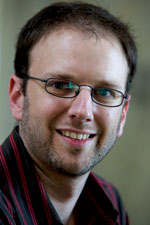From the editor: Bring on the protons
 |
| Photo: Reidar Hahn, Fermilab |
As this issue of symmetry goes to press, the most ambitious physics experiment in history is about to take a major step toward full operation. Scientists, engineers, and technicians at CERN, the European particle physics laboratory, will attempt to send highly energetic protons around the Large Hadron Collider, a 27-km ring containing thousands of magnets, guiding those particles with exquisite precision. If all goes well, protons will be circulating both directions and colliding within a few weeks.
It is nearly 30 years since past CERN Director General John Adams first suggested plans for a future proton-proton collider during a CERN Scientific Policy Committee meeting. Work intensity on the LHC project has steadily increased in that time, and has now reached the point of what LHC Project Leader Lyn Evans has called finishing a marathon with a sprint. In this issue of symmetry, Katie McAlpine writes about how physicists from US institutions have dedicated their work lives to the LHC, driven by the desire to see it in operation.
The excitement leading up to the launch is palpable not only at CERN but in other laboratories in the United States and around the world. Cafeteria discussions dont stray far from the LHC for very long.
Physicists are not the only ones excited about the startup. Rarely has there been so much media buzz for a science experiment that hasn't actually begunnews outlets tend to pay attention only after results are in. I have found in the past few months, as have many of my colleagues, that merely mentioning that I work in a physics laboratory elicits questions about that big new atom smasher somewhere in Europe. People might not know all the details, but they sense something notable is about to happen.
The LHC is capturing peoples imaginations in ways that basic science doesnt achieve very often. The same Katie McAlpine who writes in this issue moonlights as science rapper, AlpineKat, and her Large Hadron Rap has been watched nearly 1.5 million times so far on YouTube. That is a credit to her innovative approach to science communication but also reflects the genuine appeal of fundamental science discovery.
Interest in the LHC is at fever pitch, and we havent even started the science. Bring on the protons, and let's find out what secrets nature is waiting to reveal.
David Harris, Editor-in-chief
Click here to download the pdf version of this article.


